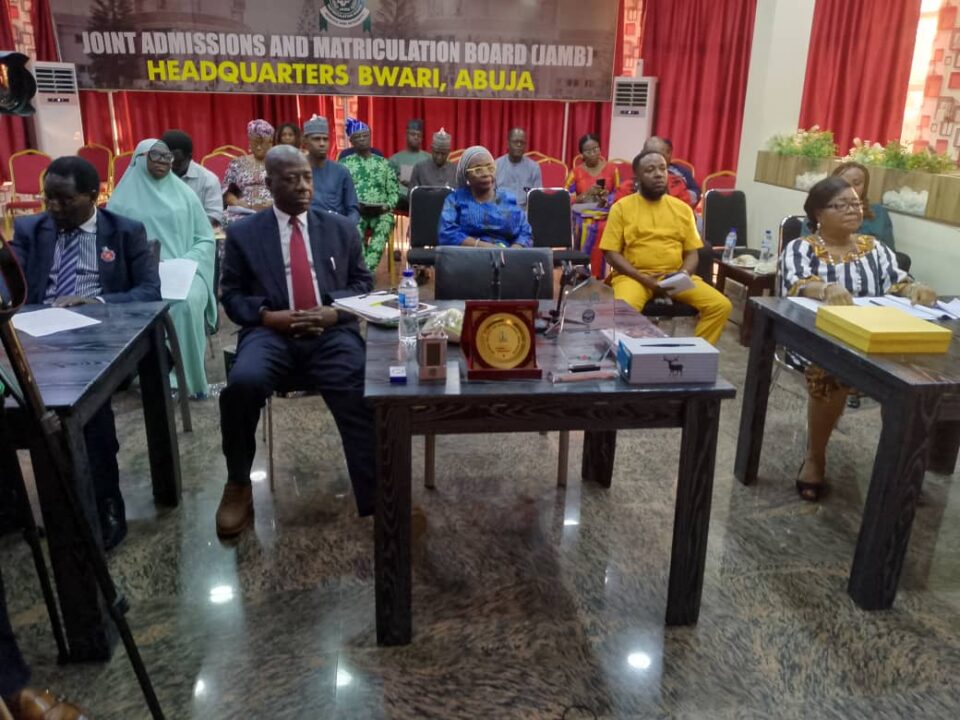By Felix Khanoba
The Science, Technology, Engineering, Arts and Mathematics (STEAM) Education’s implementation team’s chairman, Prof. Emerita Obioma Nwaorgu, has emphasized the transformative potential of the initiative in enhancing students’ performance in the Unified Tertiary Matriculation Examination (UTME) and other academic activities in the country.
Presenting a report on the STEAM Education project at the Joint Admissions and Matriculation Board (JAMB) headquarters on Wednesday in Abuja, Prof. Nwaorgu expressed optimism about the project’s impact on academic outcomes in the six pilot states where awareness and sensitization campaigns have been conducted.
“There is also high expectation on improvement of UTME results in the six states, as I mentioned earlier, based on the interest expressed by the teachers and learners during the UTME teacher sensitization workshop and students’ UTME training,” she said.
Prof. Nwaorgu underscored the need for full integration of the STEAM approach, which incorporates Arts into STEM, into pre-primary, primary, and secondary school curricula to drive technological and educational advancement.
She emphasized that addressing barriers to the project’s implementation is critical for Nigeria’s ability to compete in a science and technology-driven global landscape.
According to her, the initiative fosters interdisciplinary learning, critical thinking, problem-solving skills, and hands-on activities.
Despite its benefits, Nwaorgu lamented that STEAM education in Nigeria has not received the necessary prioritization and support for full-scale implementation.
“When you introduce design into learning, programme it makes it better and you can start teaching children at a younger age, moulding them to have critical minds at a younger age,” she added.
The project, which began in 2023, has been piloted in Adamawa, Ebonyi, Nasarawa, Ondo, Rivers, and Sokoto states. A total of 222 teachers, selected by the Ministry of Education, have interacted with the implementation team. While private schools have begun to adopt STEAM education, public schools are yet to follow suit.
Nwaorgu revealed that key partners such as the Nigerian Academy of Science, the Nigerian Academy of Letters, and the Nigerian Young Academy are collaborating on the project to develop locally appropriate STEAM policies, strengthen teacher capacity, and raise awareness in schools.
According to the renowned scholar, one notable achievement of the initiative is its inclusion in the federal government’s 2024 education roadmap and the development of a draft policy document for STEAM education in Nigeria.
Prof. Nwaorgu recommended that the initiative be expanded to the 30 remaining states and the Federal Capital Territory, expressing optimism about improved UTME performance in the six pilot states.
Earlier, the Registrar of the Joint Admissions and Matriculation Board, JAMB, Prof. Ishaq Oloyede, stated that the project should be the beginning of collaboration with various academies in Nigeria.
Represented by JAMB’s Director of Finance and Accounts, Mufutau Bello, Oloyede expressed hope that soon, the team would leverage the many opportunities available in research to impact the education sector positively.
He expressed delight that academic of science and academic of arts were working together on the STEAM project towards enhancing the growth of the nation’s education sector.
Speaking on behalf of the Nigerian Academy of Science, Prof. Salihu Mustapha noted that the initiative has heightened awareness of STEAM education among schools.
He assured that the academy would work towards ensuring its full implementation nationwide.



